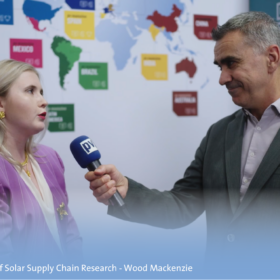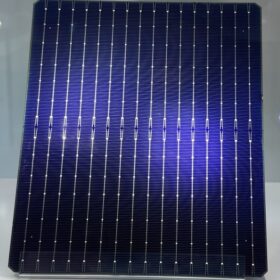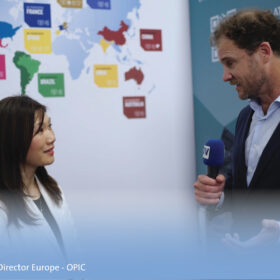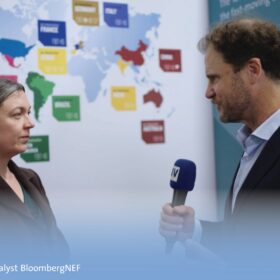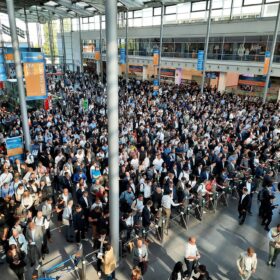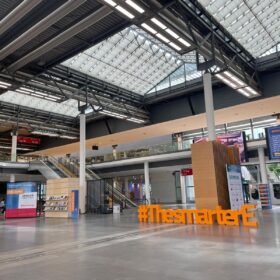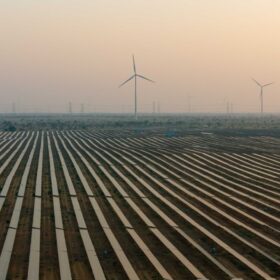‘Good time to be battery storage developer’
At Intersolar Europe 2024, ESS News spoke with George Hilton, research and analysis manager at S&P Global, about the state of play in the battery energy storage supply chain and falling prices. According to Hilton, the overcapacity at every level of the supply chain has led to prices that are no longer sustainable for many market players. Meanwhile, technological innovation has led to an unprecedented variety of battery storage technologies on offer, and for a great number of markets the right time to jump in is now.
‘We expect solar panel prices to stabilize in the second half of the year’
At Intersolar Europe 2024, pv magazine spoke with Edurne Zoco, executive director, Clean Energy Technology at S&P Global Commodity Insights, about module price trends, increasing solar demand and PV manufacturing outside China. She claims panel prices may stabilize in the second half of this year or in early 2025 and says top seven Chinese manufacturers may even continue with capacity expansion plans. She also believes that, without further substantial incentives, Europe will not be able to recreate a domestic PV supply chain.
‘Module prices surprisingly keep going down’
As part of our Intersolar 2024 interview series, pv magazine spoke with Yana Hryshko, head of Solar Supply Chain Research for Wood Mackenzie, about overcapacity, declining panel prices and expected PV demand for the next years. She revealed that Chinese module procurement schemes are currently seeing unprecedented, “ridiculously” low bids, but she also noted that the $0.08/W threshold may now be difficult to exceed. Hryshko also expects many manufacturers to backpedal on previously announced capacity expansion plans and renegotiate module supply contracts.
Chinese solar cell maker to build 10 GW factory in Oman
Chinese solar cell maker Hainan Drinda New Energy Technology plans to build a 10 GW factory in Oman to produce tunnel oxide passivated contact (TOPCon) solar cells.
‘They are all selling below their cost prices’
In the second interview in a series held at Intersolar 2024, pv magazine spoke with Karen Tang, editorial director for Europe at US-based global energy price reporting agency OPIS, about the strong pressure on prices across all segments, including the downstream business. She defined the current market situation as “unhealthy” and “bleak” for the PV industry, although she acknowledged that overcapacity is also making solar extremely competitive compared to all other energy sources. Tang also expects pressure on electricity and gas prices to continue this year.
‘In the next year, some of these guys are going to be bankrupt’
At Intersolar in Munich, pv magazine spoke with Jenny Chase, solar analyst at BloombergNEF, about the incredibly low polysilicon prices, massive overcapacity, and increasing consolidation. According to Chase, this year there will be enough polysilicon capacity to produce 1.1 TW of solar modules, but global module demand is expected to reach around 585 GW. “That is a pretty huge delta,” she said, noting that the solar industry should also prepare for a series of “negative feedback mechanisms,” such as negative prices and excess of solar power.
Intersolar 2024: Day 3: Tecloman unveils Cubox mobile storage platform
Our pv magazine newshounds will be walking the floors for one last time in Munich today as Intersolar Europe 2024 winds down for another year.
Intersolar Liveblog 2024: Ban-Ki Moon, Cate Blanchett at ‘We Choose Earth Tour’
Our pv magazine newshounds are walking the floors in Munich today to bring you all the developments at Intersolar Europe 2024.
India’s GUVNL allocates 500 MW hybrid wind-solar at $0.040/kWh
Gujarat Urja Vikas Nigam Ltd (GUVNL) has awarded 500 MW of hybrid solar-wind projects at an average rate of INR 3.36 ($0.040)/kWh. The winning developers will install grid-connected projects on a build-own-operate basis, with the freedom to choose any location in India.


